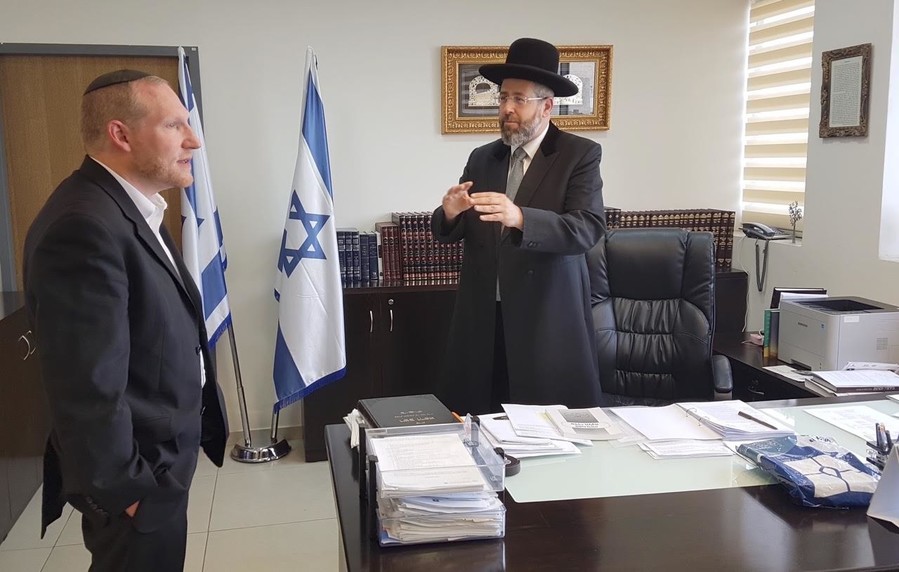Israel rabbinate ‘blackllists’ Orthodox rabbis, then apologizes to one
After furor, chief rabbinate tells Nefesh B'Nefesh's Rabbi Fass it's sorry
[Updated July 13 with correction]
After Israel’s chief rabbinate last week distributed what a critic described as a rabbinical “blacklist” of Orthodox rabbis, the chief rabbinate apologized on Tuesday to one of those it defamed — Rabbi Yehoshua Fass, co-founder and executive director of Nefesh B’Nefesh.
“I regret that this incident may have called your reputation into question,” said a statement signed by Rabbi Rephael Frank, senior adviser to the chief rabbi. “The chief rabbinate recognizes and appreciates you as a rabbi and all that you have done for the Jewish people.”
Israel’s Ashkenazi chief rabbi, David Lau, met with Rabbi Fass on Tuesday.
One-hundred-sixty spiritual leaders from 24 countries, including the United States and Canada, are on the list. In addition to Reform and Conservative spiritual leaders, the list includes such Orthodox luminaries as Rabbi Fass and Rabbi Avi Weiss, the liberal Orthodox rabbi from Riverdale; Rabbi Joshua Blass of Kehillas Beis Yehudah in Rockland County and student adviser at Yeshiva University’s rabbinical seminary; Rabbi Adam Scheier, of Canada’s oldest traditional Ashkenazi synagogue and a past president of the Montreal Board of Rabbis; and Rabbi Daniel Kraus, director of education at Kehilath Jeshurun on the Upper East Side.
The chief rabbinate controls all Jewish marriage in Israel, and immigrants who wish to wed there must first prove to its satisfaction that they are halachically Jewish — something that often affirmed by letters from the convert's rabbi. The list released last week names rabbis whose letters it rejected during 2016.
The chief rabbinate sent its list to Itim, a nonprofit that guides Israelis through the country’s religious bureaucracy, a result of an Itim-filed 2015 freedom-of-information request in a Jerusalem municipal court demanding a list of approved foreign rabbis.
Rabbi Seth Farber, Itim’s executive director, has repeatedly called for greater transparency in the rabbinate’s evaluation of rabbis, and said the way it is being handled is a “stain on the state of Israel.”
“They’re effectively creating a blacklist,” Farber told JTA. “The dimensions are greater than we could have ever imagined, and the disregard with which they treat rabbis from around the world is astounding.”
Rabbi Lau said in a public letter on Sunday that he was shocked that the list was released.
“This was done without the rabbi’s knowledge or his agreement. How can a list like this be publicized without the rabbi being made aware of the list itself or of its publication?” read the letter written by an aide on behalf of Lau and issued Sunday.
“The results of this are very serious,” the letter continued. “First of all, an employee in the chief rabbinate cannot decide on his own to publicize who the Rabbinate approves or not. Secondly, the damage this does to certain rabbis cannot be exaggerated — including to the chief rabbinate.”
According to a JTA tally of the 66 U.S. rabbis on the list, at least one-fifth are Orthodox.
“The way they’re conducting themselves is so painful, so unfortunate,” Rabbi Weiss told JTA on Friday. “The pain that I feel is not personal. It’s that this rabbinate is an arm of the State of Israel, and that we have reached this point is nothing less than a tragedy.”
In 2013, the rabbinate rejected a proof-of-Judaism letter from Rabbi Weiss, then reversed course and accepted it following complaints from American Jewish leaders. Last year, the rabbinate rejected a similar letter from Rabbi Haskel Lookstein, Kehilath Jeshurun’s former rabbi and the rabbi who oversaw the conversion of Ivanka Trump. It also rejected conversions overseen by Rabbi Gedalia Dov Schwartz, chief presiding judge of the National Beth Din of the Rabbinical Council of America, the main modern Orthodox rabbinical court in the United States.
These rejections have caused consternation among American Orthodox leaders who are invested in maintaining a good relationship with the chief rabbinate. But following Rabbi Weiss’ initial rejection in 2013, former rabbinate spokesman Ziv Maor told JTA that examining the credentials of Orthodox rabbis is crucial to the integrity of the evaluation process.
“The testimony needs to be according to Jewish law and the witness needs to have the fear of heaven,” Maor told JTA. Regarding Rabbi Weiss, he added, “We’re talking about someone on the fringes of Orthodoxy.”
Rabbi Baruch Goodman, who runs the Chabad-Lubavitch center at Rutgers University in New Jersey, said he was surprised to find out he was on the list. Goodman, who declined to be quoted, told JTA he has been writing proof-of-Judaism letters for nearly two decades without incident.
Montreal's Rabbi Scheuer told JTA on Friday, “I know I’m in good company on the list. There are wonderful, honest, unparalleled rabbis that have been blacklisted by the State of Israel.
“No one who knows me or knows my community or knows my rabbinate could question my capacity to attest to the Jewish identity of the members of my congregation.”
Rabbi Fass, whose organization has assisted over 50,000 olim to Israel over the past 15 years, said after meeting with Rabbi Lau on Tuesday: “The rabbinate should serve as a shining example of unity and connectivity within Judaism and promote its positive values in order to bridge any divides and prevent sinat chinam (baseless hatred).”
Updated July 13 to correct the misattribution to Rabbi Fass of a statement made by Rabbi Scheuer. We apologize for this editing error.

 47.0°,
Fair
47.0°,
Fair 




